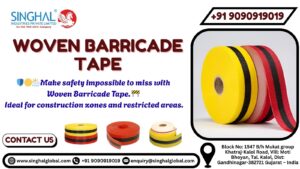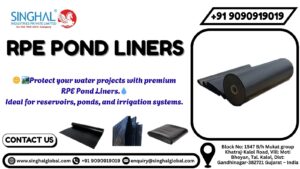A globalized world of logistics and transportation would seem impossible without container liners-an element that business organizations consider for transporting big volumes of bulky goods proficiently, reliably, and cost-effectively. These specially designed liners, which are lined in the interiors of containers, can provide an important benefit, especially for transporting agricultural products. From farm to freight, container liners have become versatile instrument to assure the protection, sustainable, and timely movement of products over great distances. Focusing here on the role of container liners in agricultural logistics and beyond, we draw on our understanding of container liners, as well as their importance in these areas of logistics. Singhal Industries is a leading Container Liners Manufacturer in the country.
Understanding Container Liners
A liner is one of the flexible, large plastic bags, whose size is crafted to fit into a standard shipping box. Manufactured from fabrics like polyethylene, polypropylene, or other durable and food-safe plastics, liner bags are mainly utilized in transporting large amounts of cargo. Flexible liner bags, capable of holding a wide variety of cargo, including grains, powders, chemicals, and other dry bulk commodities, provide a barrier against contamination, moisture, and pests.
The liner creates a protective seal in the container, thus forming a clean and hygienic environment for the goods being transported. In this manner, the goods do not get harmed through environmental aspects, such as moisture changes in temperature and dirt, which may result in a negotiation on the integrity of the cargo. Container liners revolutionized shipping by delivering an affordable, cost-effective, and efficient method of moving goods that otherwise would require more specialized or complex packaging methods.
Container Liners in Agricultural Transportation
Containers liner is one of the most fundamental industries that have helped facilitate the agricultural sector. There is an immense need for food and other agricultural products that involve transporting a lot from farms to markets all around the world. It, in most cases, entails long-distance transportation via sea, rail, and land where such products are exposed to a variety of environmental conditions that may alter their structure. Container liners help to contend with the risks above and ensure the safety and arrival of grains, pulses, dry fruits, among others, at their destination in the best possible condition. To purchase the high-quality Container liner sheet in India just need to contact Singhal Industries where you will get the best container liner sheet in India.
The Best Serve
For farmers and suppliers, it is always a matter of great concern that their crops do not deteriorate during transportation. Fresh produce and other agricultural goods are mainly vulnerable to moisture, due to which they suffer from mold, spoilage, and weight loss. The liners will act as a moisture barrier. For example, the container liners will prevent moisture from penetrating into the contents. In shipping grain such as wheat or rice, the liners ensure that it is kept dry and never allows grains to absorb moist from the surrounding atmosphere that would lead to spoilage or mold growth. There are various Container liner manufacturers in India but Singhal Industries is leading the pack.
Container liners can also be fitted with a desiccant-the term for moisture-absorbing agents. Indeed, desiccants significantly improve the liner’s ability to protect agricultural products from spoilage. This is especially the case for long-duration shipments-of several weeks-by continents as goods may encounter different climatic conditions within such a period.
Minimizing Contamination and Maintaining Hygiene
Exogenous contamination through pests, soil, and other pollution was one of the biggest challenges in transporting bulk cargo. For instance, most food products require hygienic conditions. Sealed inside the container, these liners will provide a cover for the cargo in relation to the surrounding environment, thus lowering the possibility of contamination.
In the case of liners being food-grade material, there is a guarantee that no harmful chemicals will penetrate through. Moreover, because the liner has a smooth and clean surface, it creates minimal chances for cross-contamination since there are very minimal crevice or openings for dirt and insects to get in.
Ease of Handling and Loading
One key advantage of the use of container liners in agricultural shipping is that it makes loading and unloading processes very easy. The container liners are usually constructed in a manner that facilitates easy loading and unloading with the aid of special equipment such as pneumatic system or vacuum pumps. This shipment of bulky agricultural products entails less time and more efficiency. There is low labor cost and fewer opportunities for damage to the product.
The liner design also makes unloading cleaner and more efficient since the liner can be emptied or discarded easily, leaving the container in great condition for the next shipment. This way, the container liner not only restructures logistics but also helps in the competence of the entire supply chain.
Beyond Agriculture: The Versatility of Container Liners
While container liners have recognized to be pretty beneficial in farming logistics, their applications go way beyond just that. Chemical and pharmaceutical companies, construction, and mining share among others use these liners for shipping diverse bulks.
Chemical and Hazardous Materials Transport
Container liners are important for chemical transport, especially in avoiding leakage and contamination. During a liquid, powdered, or granular chemical transport, the liners assist in safeguarding against spills or contamination of the environment. Special coatings or linings can be incorporated into certain liners for safe transportation of dangerous goods, such as chemical products or pharmaceuticals, which can be sensitive to moisture and perhaps other environmental conditions.
For instance, bulk chemicals carried in a container with a liner minimize the risks of spilling and having accidents, thereby the product is delivered without causing harm at its destination. The usage of liners also helps in attaining regulatory compliance in the international shipping whereby high levels of safety are expected to be followed.
Non-Agricultural Bulk Products
Container liners aren’t just for farming or chemical items. There are various industries working with bulk fabrics, varying from the structure to mining and even food processing that utilize these to ship different items. For example, construction companies might utilize liners for the shipping of bulk cement or sand. The item will arrive at their destination without compromise from pollutants or dampness. Likewise, in mining, minerals and ores can be transported in liners to preserve integrity and quality during long-distance transport.
Environmental Benefits of Container Liners
Most people think that container liners are convenient and efficient, but they also have several environmental advantages. Traditional methods of shipping bulk goods require several layers of packaging, such as sacks, pallets, or crates, which also end up producing excess waste.
Conclusion
From farm to freight, container liners are changing the way bulk goods, especially agricultural products, get shipped around the world. Their ability to be supple, effective, and protect goods against dampness, contamination, or spoilage makes them tremendously beneficial in global logistics. They are also utilized in a host of industries other than agriculture. There is safe, inexpensive transportation for bulk commodities around the globe. As the international trade continues to grow, their use will continue to be an essential component of business delivery systems carrying their product to customers around the world in safety and efficiency.
Frequently Asked Questions (FAQs)
What materials are container liners made of?
As the name implies, the material that is used for making these liners is polyethylene.
What types of goods can be shipped with container liners?
People use container liners for transporting stuff like chemicals, petrochemicals, a variety of food products, fertilizer and silica. Any product in a powder or granule form in large quantities may be transported using a bulk container liner.
Do container liners reduce packaging costs?
Container liners are one of the most economical means of transporting dry bulk goods.
Do container liners improve hygiene?
Container liners are single-use package, avoiding cross pollution between different shipments, maintaining product purity and quality.









